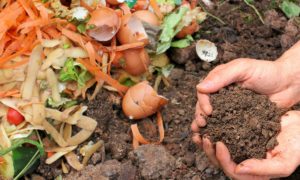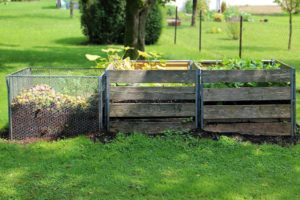It is mindful and responsible to compost organic waste instead of letting it go to the trash. It is also economical and helps in every possible way; helps you to cut the cost of manure for your plants and garden, reduces trash, thus helping save the environment.
A compost experience can be a good hobby and can even be pursued as a career to supply compost to people and businesses. Turning organic waste to compost is quite easy and time-efficient, too. Here are a few things to keep in mind while making your compost:

Preparing the base for compost organic waste
Bare earth is great to start a pile on it. It does not have to be a large patch, any available space will be good for a decent start. Bare earth will be good for aeration too. Worms and different organisms visit such sites more comfortably and more often. They are one of the chief characters to bring about the decomposition of organic waste.
Use twigs as the first layer and preferably have a few inches of this first layer. You can also use straw as the base layer. This porous layer will allow proper drainage and aeration through the pile.
Adding compost
Arrange wet and dry compost in alternate layers. Wet compost mainly comes from kitchen waste. Food scraps and fruit peels make the major part of this wet layer. It can also include seaweeds, teabags, bread leftovers, etc. Some people also toss in fruits and veggies that have started rotting.
For alternating dry layers, make use of whatever straw, twigs, or leaves you can find around. This would be a great way of saving all those fallen leaves and broken twigs from going to waste. That’s a huge favor to the surrounding environment. You can even add wood ashes for the dry layer; just make sure you sprinkle it evenly.
If you don’t add a try layer, your compost will clump together, making it less porous and hard to break down. Sawdust is another option if you can get your hands on some that don’t have any oil or any other addition in it.

Adding Nitrogen
Usually, some kind of manure is used to add as a source of nitrogen. It is very important to activate the compost and keep the breakdown process going on. There is a variety of manure like wheatgrass, grass cuttings, or buckwheat that can be used for this purpose.
Compost experience is all about regular care
Once you have your pile ready with its layers, there are a few things that you have to take care of on a regular basis.
Keep it moist and keep it covered
If there is frequent rain, that will be enough to keep this pile moist. But if not, water it often to avoid it getting dry. To retain moisture, cover it with a plastic sheet or even an old carpet will do.
This will keep the much-needed heat as well as the moisture within and around the pile. Do remember that you just have to keep it moist, not soak it with too much water. That will rot it all instead of decomposing. If there is excess water in a pile, add more dry material to soak that water.
Another good idea is to add some soil to it. This will make it porous and absorb that extra water to avoid drenching, leading to rotting. This is very important to keep the decomposing process going on. A plastic sheet will also prevent your pile from getting soaking wet due to rain.
Keep tossing
For proper decomposition, you need to keep the pile aerated. For this, you will need a shovel or a pitchfork to toss and turn the pile every few weeks. Oxygen facilitates the decomposition and breakdown of your organic waste more efficiently. As the pile starts decomposing, you can even add more wet and dry layers to it and keep it going.
Some people prefer mixing in the new materials instead of layering; it doesn’t matter much how you add it. The main thing is to provide oxygen by tossing it every once in a while. This aeration is necessary for breaking down and also keeps the materials in the pile from clumping and clogging.
All in all, converting organic waste to compost is a great experience. It is soulful, as it connects you with nature and makes you feel responsible for your actions. You realize that how much waste we generate every single day.
A compost experience is all about learning how to minimize this waste and how to use it productively, rather than heaping landfills. The process is neither time-consuming nor needs any special tools or expertise. Instead, it brings a sense of responsibility towards mother nature, our beloved earth, and the environment we live in.
So get involved in this experience of composting organic waste and make a change for the better.
